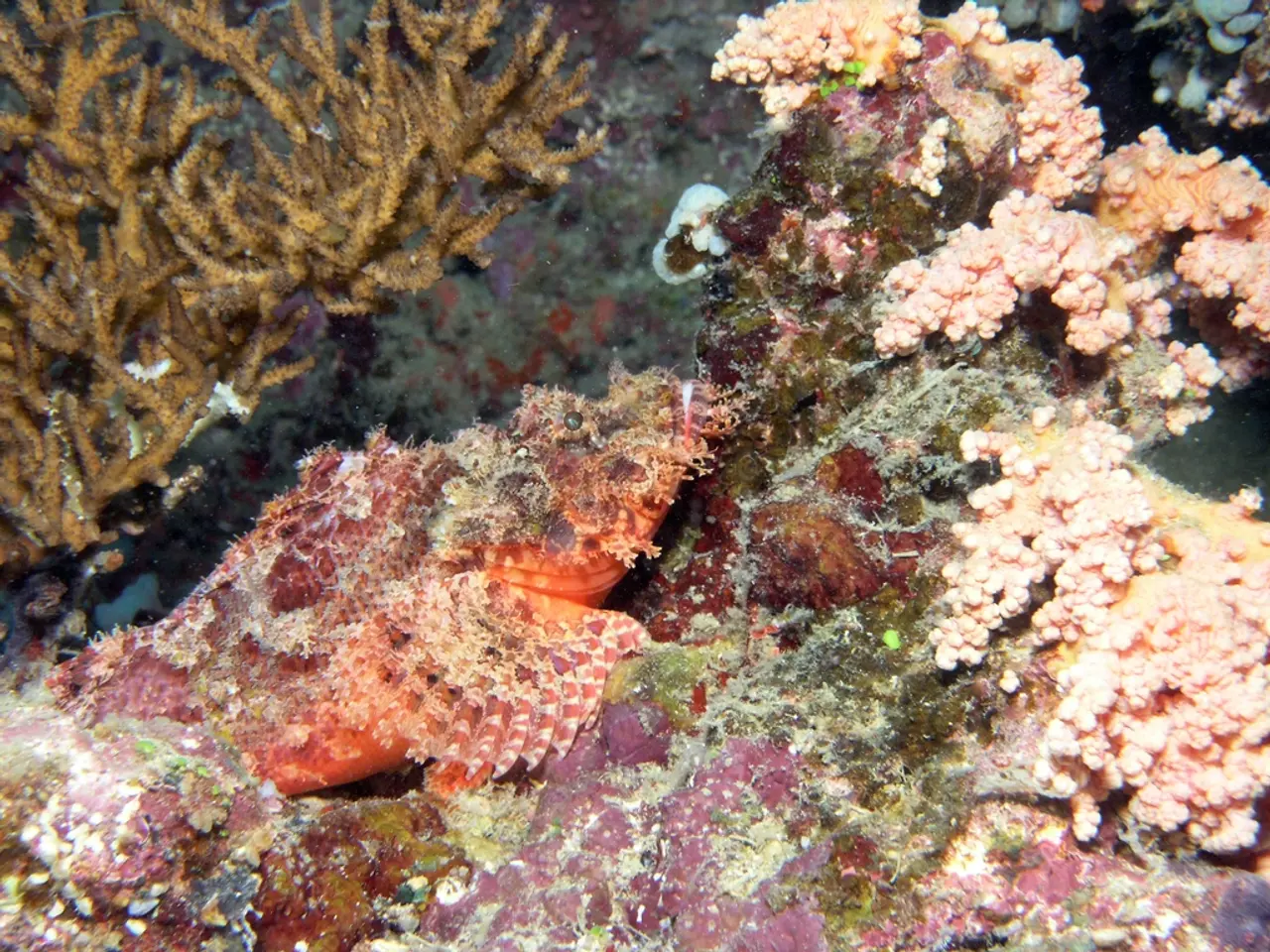Uncovering the Nutritious Value of Consuming Various Seaweed Varieties
In the vast, blue expanse of our oceans lies a hidden treasure trove of nutrition - seaweed. This humble marine plant is packed with powerful anti-inflammatory and antioxidant properties, making it a potent ally in combating oxidative stress and reducing the risk of chronic diseases.
Seaweed is a veritable treasure chest of vitamins, minerals, and antioxidants. It is rich in iodine, calcium, iron, magnesium, B vitamins, fiber, flavonoids, and carotenoids, among other nutrients. The high fiber content in seaweed supports digestion and promotes regularity, nourishing the gut microbiome.
The types of seaweed with the highest nutrient density include brown seaweeds (such as kelp and rockweed), red seaweeds (such as dulse, laver, and nori), and green seaweeds. These are rich sources of vitamins (A, B12, C, E, K), minerals (calcium, magnesium, iron, potassium, zinc, iodine), trace elements (copper, manganese, selenium), fiber, and unique bioactive compounds.
Notable seaweeds include rockweed (Ascophyllum nodosum), sugar kelp, dulse and laver (red algae), nori, and Padina boryana. Each of these seaweeds offers unique benefits, from enhancing thyroid health to providing a natural source of sweetness in broths.
Incorporating seaweed into your daily diet can offer numerous health benefits. Fresh or dried seaweed snacks can be eaten as snacks or crumbled on salads and soups for a mineral boost. Cooking and broths benefit from the addition of sugar kelp and kombu, which infuse nutrients and natural umami flavour. Freshly soaked and blanched seaweed like wakame or rockweed can be mixed into salads or stir-fries.
For those who prefer a more subtle approach, powdered or blended seaweed can be added to smoothies to enhance trace element intake. Seaweed supplements, where fresh forms are unavailable, provide concentrated nutrients. Fermented seaweed enhances bioavailability of nutrients and adds beneficial probiotics.
Regular moderate consumption (a few grams daily) ensures an effective supply of rare trace elements and vitamins, especially iodine and B12, which are less accessible in other plant foods. However, due to its high iodine content, intake should be balanced to prevent excess exposure.
Seaweed is a sustainable food source requiring no freshwater or fertilizers, contributing to ecological health. Edible seaweed can be easily incorporated into various dishes, such as sushi, soups, salads, and smoothies. Roasted seaweed snacks are widely available as a low-calorie, nutrient-packed alternative to chips.
In summary, integrating brown, red, and green seaweeds such as kelp, dulse, laver, and nori into regular meals through snacks, cooking, and smoothies offers a diverse and potent nutrient profile beneficial for overall health. Seaweed is a source of omega-3 fatty acids, essential for heart health and brain function. It may aid in weight management due to its fiber content and the presence of compounds like fucoxanthin, which promote feelings of fullness and support fat metabolism.
So, the next time you're at the grocery store, consider adding seaweed to your shopping list. Your body and the environment will thank you!
References: [1] James, A. (2020). The Health Benefits of Seaweed. Medical News Today. Retrieved from https://www.medicalnewstoday.com/articles/323900 [2] Nutrition and You. (2021). Seaweed Nutrition Facts and Health Benefits. Retrieved from https://www.nutrition-and-you.com/seaweed.html [3] Sustainable Seas Trust. (2021). Seaweed: The Sustainable Superfood. Retrieved from https://www.sustainableseas.org.za/seaweed-the-sustainable-superfood/ [4] WebMD. (2021). Seaweed. Retrieved from https://www.webmd.com/diet/ss/slideshow-seaweed [5] Zhang, Y., et al. (2019). Fucoxanthin: A Potent Antioxidant with Anti-obesity Effects. Antioxidants, 8(8), 206. Retrieved from https://www.mdpi.com/2076-3263/8/8/206
- Seaweed, hidden in our oceans, contains powerful anti-inflammatory and antioxidant properties, supporting the fight against oxidative stress and chronic diseases.
- Packed with vitamins, minerals, and antioxidants, seaweed offers a diverse nutrient profile, rich in iodine, calcium, iron, magnesium, B vitamins, fiber, flavonoids, and carotenoids, among other nutrients.
- Fiber-rich seaweed supports digestion and promotes regularity, nourishing the gut microbiome, while unique bioactive compounds offer additional benefits.
- Brown seaweeds like kelp and rockweed, red seaweeds such as dulse, laver, and nori, and green seaweeds provide vital nutrients, including vitamins A, B12, C, E, K, minerals, trace elements, and fiber.
- Notable seaweeds include rockweed, sugar kelp, dulse and laver, nori, and Padina boryana, each with unique health benefits, ranging from enhanced thyroid health to a natural source of sweetness.
- Incorporating seaweed into daily meals by eating fresh or dried seaweed snacks, using it in salads and soups, or adding powdered or blended seaweed to smoothies enhances overall health.
- Seaweed supplements, when fresh forms are unavailable, provide concentrated nutrients, while fermented seaweed enhances bioavailability and adds beneficial probiotics.
- Regular moderate consumption of seaweed ensures an effective supply of rare trace elements and vitamins, especially iodine and B12, improving heart health, brain function, and potentially aiding in weight management.
- As a sustainable food source, edible seaweed requires no freshwater or fertilizers and can be easily incorporated into various dishes, contributing to ecological health and offering a low-calorie, nutrient-packed alternative to chips, making it beneficial both for personal wellness and environmental sustainability.




